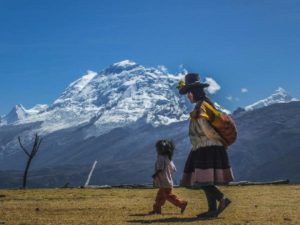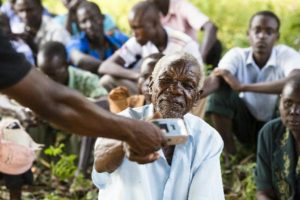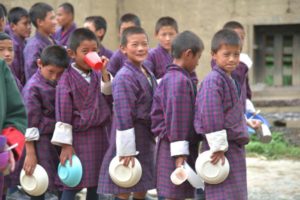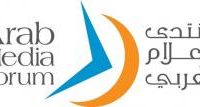Celebrating Best Practice: Expo 2020 Selects 25 Development Projects Providing Tangible Solutions To The World’s Most Pressing Challenges
A Norwegian programme to swap plastic waste for financial reward, an online software from Bhutan that calculates healthy, cost-effective school meals sourcing ingredients from local farms, and a Cameroonian project to build sustainable refugee camps are among the 25 projects selected in Expo 2020 Dubai’s Global Best Practice Programme.
The 25 success stories – all simple, effective, local solutions to some of the world’s biggest challenges – were selected during Expo 2020’s search for pioneering projects that address the Sustainable Development Goals (SDGs), 17 key targets that form a global plan of action for the peace and prosperity of people and the planet.
Expo 2020’s Global Best Practice Programme aims to advance our collective impact towards achieving these global goals by spotlighting tangible solutions that can be replicated, adapted and scaled for greater global impact, providing a platform for knowledge exchange so stakeholders from all over the world can be inspired and learn from each other.
The champion projects, which hail from 24 countries and include innovative approaches from individuals, communities, academia, businesses, international organisations and governments, will be showcased to the millions of visitors expected to attend the next World Expo.
The announcement was made at the SDG Action Zone, a space to engage partners for transformative SDG action in new and innovative ways, during an event jointly hosted by Expo 2020 Dubai and the Permanent Mission of the United Arab Emirates to the United Nations.
It was held alongside the United Nations General Assembly in New York and comes after a new Expo 2020-commissioned global survey showed that people around the world are united in their desire to create a happier, more inclusive, cleaner planet.
Under the theme ‘Small Steps, Big Leaps: Simple Solutions for Sustainable Impact’, Expo 2020’s Global Best Practice Programme is founded on the belief that achieving the SDGs by the 2030 deadline requires local solutions to ensure no-one is left behind.
Her Excellency Reem Al Hashimy, UAE Minister of State for International Cooperation, Director General of Expo 2020 Dubai Bureau and Chair of the UAE National Committee on Sustainable Development Goals, said: “The Sustainable Development Goals, universally adopted in 2015, reflect crucial issues that are relevant to us all, and it is truly inspiring to see so many tangible solutions to these most pressing challenges. I congratulate these 25 beacons of best practice and look forward to sharing their transformative projects with the world at Expo 2020 Dubai.
“Five years in, 10 years to go, the next World Expo – the first to be held in the Middle East, Africa and South Asia (MEASA) region – will provide an unprecedented opportunity to celebrate these achievements, amplify the message of the SDGs and galvanize further action. If we all step up and play our part, the 2030 deadline will be within reach.”
Expo’s Global Best Practice Programme received 1,175 submissions from 141 countries and presented a shortlist to a prestigious international selection committee that included representatives from the Bureau International des Expositions (the governing body of World Expos), the University of Cambridge, Bill and Melinda Gates Foundation, World Bank, UN-Habitat, UN-Water, UNDP, UNICEF, the Food and Agriculture Organization of the United Nations, the International Renewable Energy Agency, Abu Dhabi Fund for Development, and the Mastercard Center for Inclusive Growth.
A feature of every World Expo, the Global Best Practice Programme resonates with Expo 2020’s theme of ‘Connecting Minds, Creating the Future’ and its three subthemes of Opportunity, Mobility and Sustainability. The programme will have its own area to showcase at Expo 2020 Dubai, while the SDGs will cut across the event in all manner of ways, including at the Opportunity Pavilion, where visitors will explore how unlocking the potential of individuals and communities will enable a more prosperous and sustainable future for us all.
Vicente G. Loscertales, Secretary General of the Bureau International des Expositions (BIE) said: “Best practices are one of the most innovative and striking features of World Expos. They bring together the practical perspective of Expos, the central role of the theme and the educational responsibility of participants.
“Best practices give us another way to help unravel the meaning of progress in our present time and to share solutions in a spirit of solidarity. We look forward to seeing the continued development of the Best Practices Area in this new edition at Expo 2020 Dubai.”
Expo is also working to positively impact areas related to the SDGs via its own Expo Live programme, a USD 100 million global social impact programme that backs creative solutions to pressing challenges that affect people’s lives or help preserve the planet. To date, it has supported 120 grantees from 65 countries, demonstrating that given the right opportunity, innovation can come from anywhere, to everyone.
The 25 selected projects, below, focus on five priority development areas identified by Expo’s Global Best Practice Programme. Full details can be found at www.expo2020dubai.com/en/programmes/best-practice-programme.
Inclusive and sustainable service delivery: A reliable service provision in urban and rural areas, as well as in fluid environments such as informal, nomadic, post-disaster, emergency, and refugee settlements
- Dispensers for Safe Water, Evidence Action, Kenya
- UNICEF Drones Programme, UNICEF, Vanuatu
- WADI Solar Powered Water Filtration, Helioz, Austria
- Big Box for the Calais Jungle Refugee Camp, Jangala, United Kingdom
- 20,000 Suns, Hogan Lovells and Barefoot College, India
Livelihoods and enterprise development: Promoting alternative employment and income opportunities, women in the workplace, competitive products and services, and improved market access
- Global Plastic Waste Deposit and Tracking System, Empower, Norway
- Question Coffee 4 SDGs, Sustainable Growers, Rwanda
- The Mountain Partnership Products Initiative, The Mountain Partnership, Peru
- Digital Farmer Service, Esoko, Ghana
- Honey Production, Processing and Packaging into Value-Added Products from Rural Africa to Global Markets, Dytech, Zambia
Resilient habitats: Better protecting human, economic and natural assets in urban, rural and fluid environments
- Building a Green Refugee Camp, Land Life Company, Cameroon
- Conservation Cooperatives, Planet Indonesia, Indonesia
- Humanitarian-Development-Peace Nexus, Food and Agriculture Organization of the United Nations, Uganda
- The Sri Lanka Mangrove Conservation Project, Seacology, Sri Lanka
- Vulnerable in Vietnam, Buoyant Foundation Project, Vietnam
Social development: Reliable, affordable and appropriate healthcare and education systems and delivery
- Creating Agents of Positive Change, The Citizens Foundation, Pakistan
- Hygiene Promotion through Routine Immunization, WaterAid, Nepal
- SDG Camps, UNDP, Tunisia
- Janma Clean Birth Kit, Ayzh, India
- Fighting Neglected Tropical Diseases with Mobile Phones, Sightsavers Nigeria
Water, food and energy security: Smarter consumption and resource management to better meet increasing water, food and energy requirements for a growing global population
- Plus School Menus, World Food Programme, Bhutan
- Eco Village, Bangladesh Environment and Development Society, Bangladesh
- Belize’s First Cacao Agroforestry Concession within a Protected Area, Yaaxche Conservation Trust, Belize
- Agua Tica, FUNDECOR, Costa Rica
- Citizen Farm, Edible Garden City, Singapore











